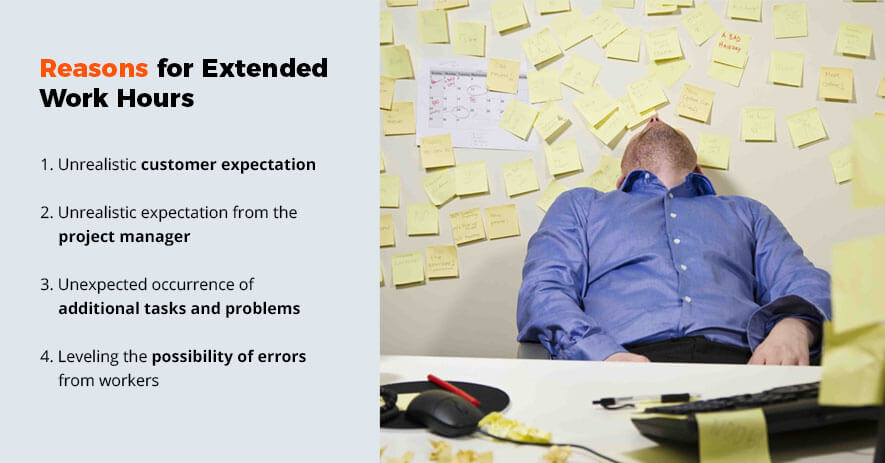PM’s Notes: Why your Team Works Overtime
by Kate Libbie | January 2, 2020 2:46 pm
Let’s face reality – we are not robots working 24/7. Overtime is not always good and often it leads to serious emotional burnout and demotivation. But, you may agree, sometimes we just don’t have any other choices. Especially when there are urgent tasks and the estimated time turned out to be too small. How to stop a scenario like this and don’t work around the clock? QATestLab[1] tried to figure it out and present valuable advice on how to eliminate the extra hours’ dilemma for PMs.
Main reasons why your team faces working overtime
Running after time is definitely an unpleasant thing. Experience shows we face the problem of overtime unexpectedly. This is further compounded by a lack of freedom and time to change the situation. Why does it happen? In fact, there is no one clear answer, there are several reasons:

1. Unrealistic customer expectation
The first and foremost reason to work overtime is unrealistic terms assigned by the customer. Whether it is a race against a competitor or a project that requires quick results, in such cases the PMs have only one thing – the date when the project must be completed. Of course, the team, in turn, has to do everything at any cost, and working extra hours becomes the only solution.
2. Unrealistic expectation from the project manager
PM can also throw some cold water on everything and underestimate the number of hours required to complete a particular task. The strategy of giving ambitious timeframes may motivate a team to work faster at first, but such an approach won’t work much longer. Each worker is unique and has its own approach to work. Each task is unique and requires a certain amount of time, which in most cases cannot be accurately calculated.
3. Unexpected occurrence of additional tasks and problems
Another reason for overtime is ignoring possible deviations from the plan. We don’t know for sure what problems may anticipate us. But it is better to rely on the allocation of additional time for such cases than to rely on perfect adherence to the plan. This is utopia. Changes in the content of the project, as a rule, entail a re-planning of the project as a whole, or at least its significant parts (risks, budget, schedule, etc.).
4. Leveling the possibility of errors from workers
Last but not least reason for the overtime is leveling the possibility of faults. If you’re a PM and you’re expecting a flawless performance from the worker – you are going nowhere. To err is human. We need to understand that no matter how many mistakes we have made, more important is the ability to dig deeper and find the solution for it.
Advice on how to avoid overtimes
More doesn’t mean better. But the current rhythm of business processes is evolving at the speed of mega octets per second. To stay competitive, you need to be more productive and so avoid overtime. So, how to stop working too many hours? Here are some of the best advice for PMs:

1. Organize proper planning
Is it possible to do the work on time without a proper plan? Unlikely. Project manager duties include understanding what needs to be done, drawing up a plan and carefully monitoring its implementation. Remember, proper time-slots allocations are not just a whim but a must! In other cases, we face the problem of the difference between the plan and what we have in fact.
2. Understand workflow better
It is logical that the project manager should understand not only metrics and information but also employees working hours. Below is a checklist of questions to help understand workflow better:
- Who is involved in planning sessions?
- Who provides estimates of the duration of work?
- Is there a planning session? If so, is it possible to evaluate the approach?
- What units are used for the assessment team? Does everyone understand their scale the same way?
- What does the team show the client as the result of the scheduling process?
- Are advanced stakeholder analysis models (matrices, cognitive maps) used? If so, how these artifacts are updated?
- How is stakeholder feedback collected?
3. Improve a team’s internal processes
If you have new problems with the project, overtime will only make the situation worse. What to do to prevent this and improve a team’s internal processes? Here’s another checklist of questions to make better team management[2]:
- Is there a change management process[3] in the project?
- Are all project participants aware of how the changes to the project are handled?
- Is there a steering committee on the project? Is its role in resolving conflicts associated with changes in content?
- What does a product backlog refinement session look like?
- What are the responsibilities and roles of the product owner?
- Do all involved employees know the project goal/vision of the product?
- Are flexible goals used in building roadmaps? How are they formulated?
- What documentation is used to trace requirements?
4. Communicate with the customer
What if force majeure happens? For example, PM and customers do improper planning and this leads to overtime. What if the client insists on the team working overtime? In such cases, it’s worth not being afraid of a direct conversation with the customer, no matter how complicated it seems. This communication should not be about fault, but about the current objective situation and what can be done with it. Good managers will always convince the client that overtime is a ladder leading down.
5. Minimize non-priority tasks
Let’s unveil the mystery: even though PM made a mistake in planning, there is still hope to work with no overtime. The main thing is to understand this mistake in time, minimize non-priority tasks and take care of urgent things. For example, internal meetings often absorb wasting time. Short discussions are useful for discussing controversial issues, but long meetings from 60 to 90 minutes are usually not productive. Scrutinize all meetings on their necessity.
Conclusions
All work and no play makes Jack a dull boy. Do you remember that? Do not force your team to work overtime – this will only create the illusion of productive activity. Even though for some specialists working for 10-12 hours will give good results, this will have only a temporary effect. In order to avoid professional burnout, use our advice and stop working around the clock. Good luck!
Have something to add? Feel free to give your opinion in the comment section below. Visit our blog to learn more about Quality Assurance / Quality Control processes.
Learn more from QATestLab
Related Posts:
- QATestLab: https://qatestlab.com/
- team management: https://blog.qatestlab.com/2019/12/10/performance-management-tools/
- management process: https://blog.qatestlab.com/2019/10/03/top-project-management-tools/
- Performance Management Tools: Types, Challenges & Solutions: https://blog.qatestlab.com/2019/12/10/performance-management-tools/
- Practical tips for PM: How to build a QA Dream Team: https://blog.qatestlab.com/2019/10/22/build-qa-team/
- Top 10 Tools for Effective Project Management: https://blog.qatestlab.com/2019/10/03/top-project-management-tools/
Source URL: https://blog.qatestlab.com/2020/01/02/team-works-overtime/

